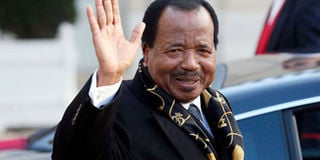Cameroon's Paul Biya vows to crush separatists

Cameroon president Paul Biya. PHOTO | PATRICK KOVARIK | AFP
What you need to know:
Armed groups have continued pushing the regions’ secessionist agenda.
Cameroon is deeply divided with the Anglophone region agitating for secession into a republic of Ambazonia.
The agitation for secession, which started in 2017, led to a crisis that has left 3,000 people dead.
Cameroon President Paul Biya has said government troops will crush those who disrupt of peace in the restive English speaking Northwest and Southwest regions.
In a televised New Year message Tuesday night, President Biya, who has ruled Cameroon since 1982, said the security situation in the two Anglophone regions is one of the country’s the most urgent problems at the moment. Armed groups have continued pushing the regions’ secessionist agenda.
BRAINWASHED
He said the government had in the recent months tried to engage young Cameroonians who are fighting, most of who he said have been brainwashed.
He said they have been called upon to surrender their weapons.
“For those who persist in going down the wrong road and continue to use violence, we will have no other choice but to combat them in order to protect all our fellow citizens,” President Biya said.
“Our Defence and Security Forces will, once again, perform their duty with restraint, but without weakness. I wish to reassure them of my full support,” the president added.
SEPARATIST FIGHTERS
Separatist fighters are yet to comment on the president’s address. It is not the first time the Head of State is issuing such a warning.
Cameroon is deeply divided with the Anglophone region agitating for secession into a republic of Ambazonia.
They claim that political leadership and allocation of resources is skewed in favour of the Francophone regions.
The agitation for secession, which started in 2017, led to a crisis that has left 3,000 people dead.
At least 500,000 others have been displaced internally, while 40,000 have been forced into exile in Nigeria, according to an International Non-Governmental Organisation.
The government, however, claims the figures have been inflated.
“Cameroon has only 152,000 internally displaced persons in the Northwest and Southwest regions,” Territorial Administration Minister Paul Atanga Nji told a press conference in Yaounde last weekend.
DIALOGUE
President Biya called a national dialogue in October 2019 to seek solutions to the crisis. The talks were undermined by absence of rebel leaders and claims that government officials handpicked delegates.
But in his New Year message, the president said the peace talks marked a great opportunity for communion where participants expressed the need for peace and national unity.
“I noted with satisfaction that all Cameroonians welcomed many of the proposals made during the Major National Dialogue,” Mr Biya said.
As part of the proposals from the dialogue, parliament adopted two bills; one on the promotion of bilingualism and another granting a special status to the troubled regions.
LANGUAGE LAW
The leader said he was convinced that effective implementation of the language law would strengthen Cameroon’s bilingual nature, a task however complicated by different cultures, education and judicial systems in the two regions.
“The special status granted the Northwest and Southwest regions takes into account the specificities of the Anglophone education sub-system, common law and traditional authorities,” the president said.





